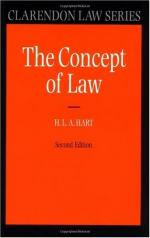
|
| Name: _________________________ | Period: ___________________ |
This test consists of 15 multiple choice questions and 5 short answer questions.
Multiple Choice Questions
1. What does Hart wonder about international law?
(a) It is law at all.
(b) If it is necessary.
(c) Is it applicable.
(d) If it is doomed to fail.
2. What do statements of internal aspect presuppose the truth of?
(a) Internal statements.
(b) External statements.
(c) Simple statements.
(d) Multiple statement.
3. What happens when secondary rules are accepted, according to Chapter 6?
(a) Societies have authoritative methods to determine what law is.
(b) Societies have authoritative methods to change morale.
(c) Societies have authoritative methods to change laws.
(d) Societies have authoritative methods to determine what custom is.
4. How are international laws and morality tied?
(a) In complex ways.
(b) Though morale.
(c) Though customs.
(d) In Simple ways.
5. What does communication involve?
(a) Communities.
(b) Minimal classes.
(c) Class term.
(d) Maximal classes.
6. When does the second question arisen by Hart's theory appear?
(a) When we analyze the idea that a custom can not be said to exist.
(b) When we analyze the idea that a legal system can be said to exist.
(c) When we analyze the idea that acustom can be said to exist.
(d) When we analyze the idea that a legal system can be said not to exist.
7. What can statement of law made as?
(a) Low or high.
(b) Simple or complexe.
(c) Internal or external statement.
(d) Singular or multiple.
8. What standard do we often try to employ, according to Hart?
(a) Efficiency.
(b) Fairness.
(c) Reasonableness.
(d) Speed.
9. What do rule-skepticism and formalism often do according to Hart?
(a) Contradict each other.
(b) Co write artciles.
(c) Supplement each other.
(d) Fight each other.
10. What can judges statement be because of their external point of view?
(a) Incomplete.
(b) Long.
(c) Correct.
(d) Incorrect.
11. How does Hart see international law until basic rules of recognition are formulated?
(a) As undetermined laws.
(b) As stepping stone toward a global law system.
(c) As a transition system to secondary rules.
(d) As unbinding laws.
12. What can the official sector be in conflict with?
(a) The people.
(b) Lawmakers.
(c) Private sector.
(d) Customs.
13. How many problems arise in studying international law?
(a) 6.
(b) 2.
(c) 3.
(d) 5.
14. How many camps does Hart divide the question of legal laws resting on moral laws, according to Chapter 9?
(a) 3.
(b) 6.
(c) 2.
(d) 5.
15. What is the risk of making someone authoritative?
(a) That person might be wrong.
(b) Authoritative people tend to be above the law.
(c) That person might change the law to her adventages.
(d) That secondary rtules would not apply. That person might lik epower.
Short Answer Questions
1. What is sometime given too much room to judges?
2. What does the law need not be determined by?
3. What are the ultimate rules?
4. What can the ultimate rule of recognition be recognized from?
5. What do moral rules vary across?
|
This section contains 460 words (approx. 2 pages at 300 words per page) |

|




